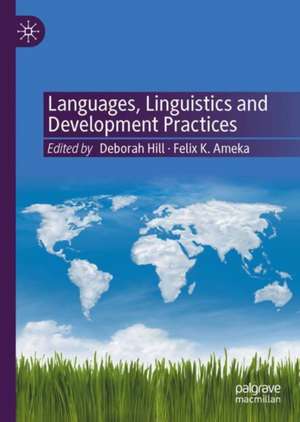Languages, Linguistics and Development Practices
Editat de Deborah Hill, Felix K. Amekaen Limba Engleză Hardback – 7 mai 2022
| Toate formatele și edițiile | Preț | Express |
|---|---|---|
| Paperback (1) | 945.02 lei 6-8 săpt. | |
| Springer International Publishing – 7 mai 2023 | 945.02 lei 6-8 săpt. | |
| Hardback (1) | 949.31 lei 6-8 săpt. | |
| Springer International Publishing – 7 mai 2022 | 949.31 lei 6-8 săpt. |
Preț: 949.31 lei
Preț vechi: 1157.69 lei
-18% Nou
Puncte Express: 1424
Preț estimativ în valută:
181.71€ • 197.44$ • 152.73£
181.71€ • 197.44$ • 152.73£
Carte tipărită la comandă
Livrare economică 21 aprilie-05 mai
Preluare comenzi: 021 569.72.76
Specificații
ISBN-13: 9783030935214
ISBN-10: 3030935213
Pagini: 301
Ilustrații: XXV, 301 p. 22 illus., 9 illus. in color.
Dimensiuni: 148 x 210 mm
Greutate: 0.56 kg
Ediția:1st ed. 2022
Editura: Springer International Publishing
Colecția Palgrave Macmillan
Locul publicării:Cham, Switzerland
ISBN-10: 3030935213
Pagini: 301
Ilustrații: XXV, 301 p. 22 illus., 9 illus. in color.
Dimensiuni: 148 x 210 mm
Greutate: 0.56 kg
Ediția:1st ed. 2022
Editura: Springer International Publishing
Colecția Palgrave Macmillan
Locul publicării:Cham, Switzerland
Cuprins
Chapter 1. Introduction: What Can Linguistics and Language(s) Contribute to Development Practices? (Felix K. Ameka and Deborah Hill).- Chapter 2. Localising Global Financial Key Terms: Case Studies from East Africa (Froukje Krijtenburg, Michelle Tjeenk Willink, Felix K. Ameka, Aflatoun).- Chapter 3. Asset-Based Community Development in Diverse Cultural Contexts: Learning from Mindanao, The Philippines (Ann Hill, Anselmo B. Mercado, Anne Shangrila Fuentes, and Deborah Hill).- Chapter 4. The Changing Conceptions of Work and the Language of Work in Ghana: Towards a Research Agenda (Akosua K. Darkwah and Dzodzi Tsikata).- Chapter 5. The Importance of Mutual Understanding of Key Terminology in Development Projects: A Png Example (Jo Caffery, Lalen Simeon and Kiteni Kusunan Kurika).- Chapter 6. Peer-To-Peer Learning: The Dynamics of Kin Relations, Matriliny, and Gender (Deborah Hill, Delmay Basi and Godwin Rahe).- Chapter 7. "I Could Still Be Myself as a Warlpiri Person": How Bilingual Education Achieves Community Development Aims (Carmel O’Shannessy, Marlkirdi Rose Napaljarri, Elaine Johnson Nangala and Gracie White Napaljarri).- Chapter 8. English Language Learning as a Trojan Horse? Examining Early Childhood Teachers’ Views of Teaching Young Children in an English-Medium Ngo in India (Zinnia Mevawalla and Sanobia Palkhiwala).- Chapter 9. The Place of a Lingua Franca in Development Practice: The Case of Tok Pisin in Papua New Guinea (Catherine Levy).- Chapter 10. Lost in Translation: Disorienting Research Dilemmas in a Multilingual Country (Barbara Pamphilon).- Chapter 11. The Linguist, Language, and Economic Development: A Commentary on Languages, Linguistics and Development Practices (Salikoko S. Mufwene).
Notă biografică
Deborah Hill is Associate Professor in TESOL and Linguistics at the University of Canberra, Australia. Her interests are language and culture, language description, semantics, and language in development. She has published on the grammar and (ethno-)semantics of Longgu, Solomon Islands. She is currently leading an agricultural research for development project in the Solomon Islands.
Felix K. Ameka is a socio-cultural-cognitive linguist, and Chair Professor Ethnolinguistic Vitality and Diversity at Leiden University, The Netherlands. He is a Fellow of the Ghana Academy of Arts and Sciences, Australian Academy of Humanities and Academia Europaea. His interests are language documentation and description, language and culture, and sociolinguistics of development. He has published on the lexicon, grammar, (ethno-)semantics, (ethno-)pragmatics, and language contact of West African languages.
Felix K. Ameka is a socio-cultural-cognitive linguist, and Chair Professor Ethnolinguistic Vitality and Diversity at Leiden University, The Netherlands. He is a Fellow of the Ghana Academy of Arts and Sciences, Australian Academy of Humanities and Academia Europaea. His interests are language documentation and description, language and culture, and sociolinguistics of development. He has published on the lexicon, grammar, (ethno-)semantics, (ethno-)pragmatics, and language contact of West African languages.
Textul de pe ultima copertă
“This thoughtful and original volume provides a powerful argument that development projects will not succeed without a deep and sensitive appreciation of how local languages lie at the heart of development challenges.”
— Nicholas Evans, Director, CoEDL (ARC Centre of Excellence for the Dynamics of Language), Distinguished Professor of Linguistics, Australian National University
— Nicholas Evans, Director, CoEDL (ARC Centre of Excellence for the Dynamics of Language), Distinguished Professor of Linguistics, Australian National University
Deborah Hill is Associate Professor in TESOL and Linguistics at the University of Canberra, Australia. Her interests are language and culture, language description, semantics, and language in development. She has published on the grammar and (ethno-)semantics of Longgu, Solomon Islands. She is currently leading an agricultural research for development project in the Solomon Islands.
Felix K. Ameka is a socio-cultural-cognitive linguist, and Chair Professor Ethnolinguistic Vitality and Diversity at Leiden University, The Netherlands. He is a Fellow of the Ghana Academy of Arts and Sciences, Australian Academy of Humanities and Academia Europaea. His interests are language documentation and description, language and culture, and sociolinguistics of development. He has published on the lexicon, grammar, (ethno-)semantics, (ethno-)pragmatics, and language contact of West African languages.
Felix K. Ameka is a socio-cultural-cognitive linguist, and Chair Professor Ethnolinguistic Vitality and Diversity at Leiden University, The Netherlands. He is a Fellow of the Ghana Academy of Arts and Sciences, Australian Academy of Humanities and Academia Europaea. His interests are language documentation and description, language and culture, and sociolinguistics of development. He has published on the lexicon, grammar, (ethno-)semantics, (ethno-)pragmatics, and language contact of West African languages.
Caracteristici
Opens a dialogue between linguists and development practitioners about language in development work
Demonstrates the gulf between global and local understandings of key development concepts
Gathers experiences from Philippines, Papua New Guinea and countries in Africa
Demonstrates the gulf between global and local understandings of key development concepts
Gathers experiences from Philippines, Papua New Guinea and countries in Africa
